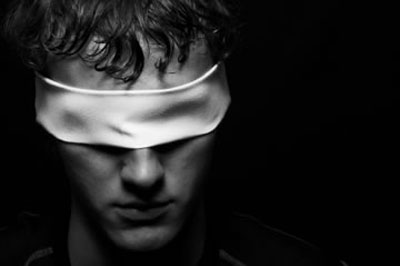(单词翻译:单击)
情景对话
Todd: Now, Mike, you mentioned that you were blind. You couldn't see.
托德:迈克,你之前说过你曾经有一段时间看不见东西。
Mike: Right.
迈克:对。
Todd: So, explain what is like when you're blind?
托德:请你说一下你看不见东西时是什么情况?
Mike: It's pretty tough. Now for me, I was 90% sure that I would get my vision back because after the surgery, the doctors had eye surgery and the doctor told me that, you know, everything will be fine but now because of the post-operative bleeding in the eye, you wouldn't be able to see for a couple of months so I knew I'd get my vision back but during that two months of not having vision it was pretty strange.
迈克:那段时间非常艰难。我有90%的把握我能恢复视力,因为手术之后,为我进行眼部手术的医生告诉我,手术很顺利,但是因为术后眼睛充血,你会有几个月的时间看不到东西,所以我知道我会恢复视力,不过看不到东西的那两个月很难受。
Todd: Did you ever have doubt, like, "Oh, what if my eyesight doesn't come back?"
托德:你有没有过怀疑,比如你有没有想过“哦,如果我的视力不能恢复怎么办?”
Mike: Of course. Every day. Every day cause you'd wake up, and in the morning, cause your.. when you fall asleep the blood gets mixed up in your eye. You wake up in the morning. Everything is completely cloudy and you're thinking, especially after like three or four weeks, I was thinking, "Am I ever going to get my vision back?" like " What's going on? This is taking a long time. It's not getting better" and you start to worry.
迈克:我当然有过怀疑。每天都在怀疑。因为每天早上起来的时候……晚上睡觉时眼睛里的充血会混在一起。第二天早上起来以后,眼前一片模糊,尤其是在这种情况持续了三四周以后,我就会想,“我的视力还能恢复吗?”或者“发生了什么事?这种情况已经持续很长时间了。情况并没有好转”然后就会开始担心。
Todd: Right, right.
托德:对,没错。
Mike: So, typically, you do think what if I'm stuck like this forever, you know, but... and I can't even play the piano like Steve Wonder, so you know.
迈克:而且还会想如果我一直这样下去怎么办,我也不能像史提夫·汪达那样弹钢琴。
Todd: Well, what's a daily routine like? Like is life more boring or do you have better sensations with sound and things like that? Like how is life different?
托德:那时你每天做些什么事情?那时你的生活是不是很无聊,还是你的听觉或其他感官会更敏锐?生活有什么不同?
Mike: I think, people say that, that you know, you're other senses build up when you are missing one of your other senses however I think it takes time to develop your... for your other senses to accommodate your sense that's lost, so in my case, I don't really think so. My hearing didn't necessarily become better or, you know, I couldn't suddenly smell something and go "Chateau Lafite 1956." It just didn't work out that way, so.
迈克:人们都认为,如果你有一个感官有缺陷,那其他感官的能力就会加强,但是我认为需要时间来让其他感官去配合有缺陷的那个感官,我认为我的情况并不是这样。我的听力并没有变好,我也没有突然有了敏锐的嗅觉,我不能闻出那是1956年的拉菲之类的。这在我身上并不适用。
Todd: You couldn't hear a dog five miles away?
托德:你不能听出来五英里以外有只狗吗?
Mike: No. No. No. Nothing like that. Nothing that good but, yeah.
迈克:不,不能,并不能。这种我做不到。其他感官并没有那么强。
Todd: Right.
托德:好。
Mike: A little tricky.
迈克:有点难。
Todd: You know, it's funny thought that you mention that because remember when we were kids, like you always knew the sound of your car. You knew when you parents were home. Like, uh-oh, that's engine for dad's car."
托德:其实听你这么说,想想有些可笑,你还记得我们小时候吗,那时你总能听见你家汽车的声音。这样你就知道你父母回来了。那时你能听出来,哦那是我爸爸的汽车引擎声。
Mike: Dad's home!
迈克:爸爸回来了!
Todd: I gotta stop screwing around.
托德:我不能再胡闹了。
Mike: Exactly. I gotta fix this broken vase.
迈克:没错,我得把那个打破的花瓶修好。
Todd: Right, so maybe that's it. There's a fear element involved.
托德:没错,可能因为那时还有恐惧因素存在。
Mike: Yeah, but in general I think it was, I mean in my case, it wasn't. I didn't have any extra senses. My sixth sense didn't suddenly develop and I could see dead people. Nothing like that.
迈克:对,我认为总的来说,我看不见时并没有觉得其他感官有增强。也没有激发出其他感官。我的第六感并没有什么改善,我也不能看见死人。什么都没有发生。
Todd: Was the day boring? You know, were you bored?
托德:那当时你的生活无聊吗?你无聊吗?
Mike: Yeah, that was probably the hardest thing was just finding things to do. My mother got me an exercise bicycle so at least I could do a little bit of, you know, activities.
迈克:无聊,那时最难的就是找事情做。我妈妈给我买了辆健身自行车,至少我还能做些运动。
Todd: Oh, that is nice.
托德:哦,那很好。
Mike: Yeah, for sure. For sure. But I picked up a lot of audio books and listened to them.
迈克:没错,很好。我还买了很多有声书听。
Todd: Did you listen to elllo?
托德:那你有听ello网站吗?
Mike: Yeah, every day. Every day. My.. Can't you tell? My English has improved so much.
迈克:有,每天都听,每天都有听。你没发现吗?我的英语进步了很多。
Todd: Wow, it really works.
托德:哇,这真的有用。
Mike: Sure, I used to talk like this. (laughter) Yeah, but I did study Japanese actually so.
迈克:当然了,我以前说话是这样的。(笑声)那时我也学习了日语。
Todd: Oh, you did?
托德:是吗?
Mike: On audio tape, yeah.
迈克:对,用录音带学习。
Todd: Oh, cool, man, cool. Well, thanks for telling your story about being blind.
托德:哦,酷,你太酷了。谢谢你和我们分享你看不见时的情况。
Mike: My pleasure. I hope I never have to tell it again. I mean, I hope I never have to live through it again.
迈克:不客气。我希望我再也不要讲这个经历了,我的意思是,我希望我再也不要经历这样的情况了。
Todd: Definitely.
托德:肯定不会了。
Mike: Thanks.
迈克:谢谢。

译文属可可原创,仅供学习交流使用,未经许可请勿转载
重点讲解
重点讲解:
1. what if (用于疑问句句首,尤用于询问不希望看到的事发生时的结果)如果…怎么办;
例句:What ifhe doesn't agree?
如果他不同意该怎么办呢?
2. fall asleep 入睡;睡着;进入梦乡;
例句:Hefell asleepwhile he was doing his homework.
他做著做著功课就睡著了。
3. work out 想出,得到(解决方法);解(谜);
例句:Office romances hardly everwork out.
和同事谈恋爱很少成功。
4. build up (使)积聚;(使)逐渐增加;
例句:He tried tobuild uphis strength.
他试图增进体质。
5. in general 总的来说;总体上来看;大体上;
例句:Actually, we do not give any commissionin general.
实际上,我们一般不给佣金。
6. for sure 无疑;肯定;
例句:Why this universal law prevails we cannot sayfor sure.
这个普遍规律为什么存在,我们尚不能确切地说明。
7. used to do sth. 过去常常;过去曾;
例句:Some cinemasused tobe called Picture Palaces.
一些电影院曾叫作电影宫。
8. live through 活过;经过(不愉快的事件或变故)之后仍旧活着;
例句:We are too young to havelived throughthe war.
我们太年轻,没经历过那场战争。


